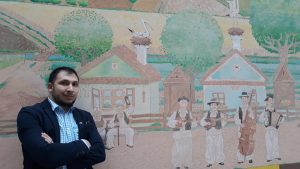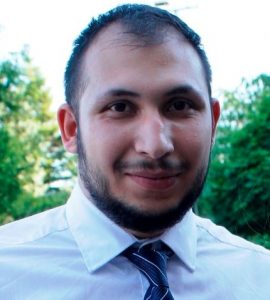“The most precious thing in our Roma culture is our history and language, which we need to preserve”
I have completed secondary school in 2014 with a major in Restaurant management. After that I started working in a restaurant in a Black Sea resort in Bulgaria for an year. I decided that this is not my vocation. I had a big desire for studies and self-development, but I didn’t have financial stability, so I got enrolled part-time in university. This way I was able to have a job in parallel. During my studies, I worked as a production area coordinator at one of the biggest cultivated mushroom companies in Bulgaria. The owners of this business were from South Korea so they used English to communicate with the Bulgarian employees. This was an advantage for me because I knew English well. I worked there for nearly two years while I was studying part-time. Seeing the competition in Bulgaria and considering my ethnic background, I understood that in order to make it in Bulgaria, I need to know a lot more than others. This is how I decided to enroll in a regular form of study, and I am now a third-year tertiary education student majoring in Business Management, with a second major in Marketing.
There is always someone who has positive influence on you. For me this was my cousin. He graduated from the university where I currently study. It is still hard for my community to allow young people to continue their studies beyond mandatory education, but he was able to demonstrate to the other Roma that anyone who really wants something, is able to succeed.
 One of the achievements that make me very happy is that I was able to motivate other young people from my community to continue their studies and become tertiary education students. In the Roma community, women drop out of school very early and marry at a young age, but there are girls from my community who are already students!
One of the achievements that make me very happy is that I was able to motivate other young people from my community to continue their studies and become tertiary education students. In the Roma community, women drop out of school very early and marry at a young age, but there are girls from my community who are already students!
What are the obstacles you have faced as a Roma, how were you able to overcome them?

One of the biggest obstacles, I could say, is discrimination. Since an early age I felt quite rejected. My parents and I have been moving to different cities in Bulgaria where they have found jobs. My hometown’s economy is underdeveloped and there are no jobs available, and I had to attend different schools in different places. Significant part of my new classmates rejected me because I was new and because I was visibly from a different ethnic background. I cannot fight discrimination by separating myself from the Roma community so I took the decision to overturn the stereotypes about the Roma. Unfortunately, a significant number of persons I have met along the way believed that Roma are thieves and bad characters. I tried to have good relationships with everyone, especially during high school and in university. I demonstrated polite attitude and positive behavior. Now I rarely feel discriminated against, not mentioning the extreme nationalists (i.e., people who are united against all different, such as Roma, LGBTQI, etc.).
How would you inspire Roma children and youth to realize their potential?
Personal example is the greatest inspiration adolescents can receive. I’ll never forget a meeting we had in a school and while I was telling the “owl story”, one of the kids who was sitting at the very back in the classroom and almost out of sight, raised her hand and her words were – “I’m Roma too!” These words were amazing to hear from a 12 years old child who had no self-confidence because all she heard about Roma was that they were bad, thieving cheaters. After hearing my story she confessed she was Roma. I think she understood that there are Roma who are good examples in our society.
At present, I am employed in an NGO as a Coordinator working with parents. Working for the development of my community with all my knowledge and skills have been a priceless experience for me. At the moment, I am participating in a community organizing preparatory program in order to develop community organizing and leadership skills.
The most precious thing in the Roma culture is precisely our history and language. Roma are in a process of modernization and within this process we have to preserve our history and language, and pass them on to the younger generation so that they can remember and know that Roma also have rich history and culture.
It is very interesting how our cultural heritage helps us in communication. Romani language is unique and allows us to communicate freely with different Roma from different countries.
Tell us about your involvement in volunteer activities and cultural events aimed at supporting Roma communities
I participated in various activities, events and advocacy meetings, and I did organize many events too. One of them was Vasilitsa – the Roma New Year. On this day Roma students of different ages demonstrate the richness of Roma culture, especially to public institutions. For the participants it is an amazing experience that contributes to boosting ethnic self-esteem.
An inspiring interview with one of REF’s outstanding students, a remarkable recipient of an RMUSP scholarship
Roma Memorial University Scholarship Program (RMUSP) is the largest Roma scholarship program of its kind, supporting students in pursuing their tertiary education in Albania, Bosnia and Herzegovina, Bulgaria, Croatia, Czech Republic, Hungary, Kosovo* North Macedonia, Montenegro, Romania, Serbia, Slovakia, and Turkey.
*This designation is without prejudice to positions on status, and is in line with UNSCR 1244/1999 and the ICJ Opinion on the Kosovo declaration of independence.

















